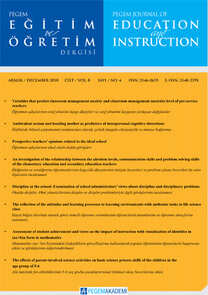A Longitudinal Study of Early Math Skills, Reading Comprehension and Mathematical Problem Solving
Erken Matematik Becerileri, Okuduğunu Anlama ve Matematiksel Problem Çözme İle İlgili Boylamsal Bir Çalışma
___
- Arbuckle, J. L. (2009). Amos 18. Crawfordville, FL: AMOS Development Corporation.
- Asık, G. (2009). A model study to examine the relationship between metacognitive and motivational regulation and metacognitive experience during problem solving in mathematics. Unpublished master’s thesis, Bogaziçi University, İstanbul.
- Aubrey, C. Godfrey, R., & Dahl, S. (2006). Early mathematics development and later achievement: Further evidence. Mathematics Education Research Journal, 18(1), 27-46.
- Aunio, P. & Niemivirta, M. (2010). Predicting children's mathematical performance in grade one by early numeracy. Learning and Individual Differences, 20, 427–435.
- Bracken, B. A. (1984). Bracken basic concept scale. Chicago: The Psychological Corporation.
- Bracken, B. A. (1998). Bracken basic concept scale-revised, examiner’s manual. Texas: Harcourt Brace and Company.
- Claessens, A. & Engel, M. (2013). How important is where you start? Early mathematics knowledge and later school success. Teachers College Record, 115(6), 1-29.
- Duncan, G.J., Dowsett, C. J., Claessens, A., Magnuson, K., Huston, A. C., Klebanov, P., Pagani, L. S., Feinstein, L., Engel, M., Brooks-Gunn, J., Sexton, H., Duckworth K., & Japel, C. (2007). School readiness and later achievement. Developmental Psychology, 43(6), 1428-1446.
- Fuentes, P. (1998). Reading comprehension in mathematics. The Clearing House, 72(2), 81-88.
- Grissmer, D., Grimm, K. J., Aiyer, S. M., Murrah, W. M., & Steele, J. S. (2010). Fine motor skills and early comprehension of the world: Two new school readiness indicators. Developmental Psychology, 46, 1008-1017.
- Hite, S. (2009). Improving problem solving by improving reading skills. Math in the Middle Institute Partnership Summative Projects for MA Degree. University of Nebraska-Lincoln. Retrieved March, 30, 2017, from http://digitalcommons.unl.edu/mathmidsummative/9.
- Jordon, N. C., Kaplan, D., & Hanich, L. B. (2002). Achievement growth in children with learning difficulties in mathematics: Findings of a two-year longitudinal study. Journal of Educational Psychology, 94(3), 586-597.
- Jordan, N. C., Hanich, L. B., & Kaplan, D. (2003). A longitudinal study of mathematical competencies in children with specific mathematics difficulties versus children with comorbid mathematics and reading difficulties. Child Development, 74(3), 834-850.
- Jordan, N. C., Kaplan, D., Locuniak, M. N., & Ramineni, C. (2007). Predicting first‐grade math achievement from developmental number sense trajectories. Learning Disabilities Research & Practice, 22(1), 36-46.
- Jordon, N. C., Glutting, J., & Ramineni, C. (2010). The importance of number sense to mathematics achievement in first and third grades. Learning and Individual Differences, 20, 82-88.
- Light, J. G. & DeFries, J. C. (1995). Comorbidity of reading and mathematics disabilities genetic and environmental etiologies. Journal of Learning Disabilities, 28(2), 96-106.
- Mayer, R. E. (1998). Cognitive, metacognitive, and motivational aspects of problem solving. Instructional Science, 26(1-2), 49-63.
- Miller, M. R., Müller, U., Giesbrecht, G. F., Carpendale, J. I., & Kerns, K. A. (2013). The contribution of executive function and social understanding to preschoolers’ letter and math skills. Cognitive Development, 28, 331– 349.
- Pagani, L.S., Fitzpatrick, C., Archambault, I., & Janosz, M. (2010). School readiness and later achievement: A French Canadian replication and extension. Developmental Psychology, 46 (5), 984- 994.
- Rose, D.S., Parks, M., Androes, K., & Mc Mahon, S.D. (2000). Imagery-based learning: Improving elementary students’ reading comprehension with drama techniques. The Journal of Educational Research, 94(1), 55-63.
- Sarama, J. & Clements, D. H. (2007). Early childhood mathematics learning. In J. F. K. Lester (Ed.), Second handbook of research on mathematics teaching and learning (pp. 461−555). Charlotte, NC: Information Age Publishing.
- Simsek, Ö. F. (2007). Introduction to structural equation model: Basic principles and LISREL applications. Ankara: Ekinoks.
- Smith, S. S. (2001). Early childhood mathematics. United States of America: Allyn & Bacon.
- Vilenius‐Tuohimaa, P. M., Aunola, K., & Nurmi, J. E. (2008). The association between mathematical word problems and reading comprehension. Educational Psychology, 28(4), 409-426.
- Wilson, S. J. (2014). School readiness and later achievement: Results from a meta‐analysis of longitudinal studies. Paper presented at the Annual Meeting of the Society for Research on Educational Effectiveness, Nashville, Tennessee. Retrieved July 14, 2015, from https://my.vanderbilt.edu/predictors/files/2013/07/Wilson-SREE-2014-FINAL.pdf.
- Yan, P. X., Wiles, B., & Yu-Ying, L. (2008). Teaching conceptual model-based word problem story grammar to enhance mathematics problem solving. Journal of Special Education, 42(3), 163-178.
- Yoleri, S. & Sevinç, M. (2011). Turkisch adaptation of the Bracken Basic Concept Scale: Expressive form. Erzincan Üniversitesi Sosyal Bilimler Enstitüsü Dergisi, 4(2), 505-522.
- ISSN: 2146-0655
- Yayın Aralığı: 4
- Başlangıç: 2011
- Yayıncı: Pegem Akademi Yayıncılık Eğitim Danışmanlık Hizmetleri Tic. Ltd. Şti.
Development of Teacher Academic Optimism Scale: The Validity and Reliability Study
A Research on Fluent Reading Skills of Secondary School Students
Öğretmen Adaylarının Epistemolojik İnançlarının Analizi: Nitel Bir Çalışma
Ayşe Gül ÇİRKİNOĞLU ŞEKERCİOĞLU, HASENE ESRA YILDIRIR
Semiha YÜKSEK USTA, Arif YILMAZ
A Longitudinal Study of Early Math Skills, Reading Comprehension and Mathematical Problem Solving
ZEYNEP ÇİĞDEM ÖZCAN, HANDAN DOĞAN
Semiha YÜKSEK USTA, Arif YILMAZ
ORHAN KARAMUSTAFAOĞLU, Şeyma BARDAK, S Seray DOĞAN ERKOÇ
Öğretmen Akademik İyimserlik Ölçeğinin Geliştirilmesi: Geçerlik ve Güvenirlik Çalışması
Yabancı Dil Olarak Türkçe Öğrenenlerin Sınav Başarılarının Dil Bilimsel Uzaklığa Göre İncelenmesi
